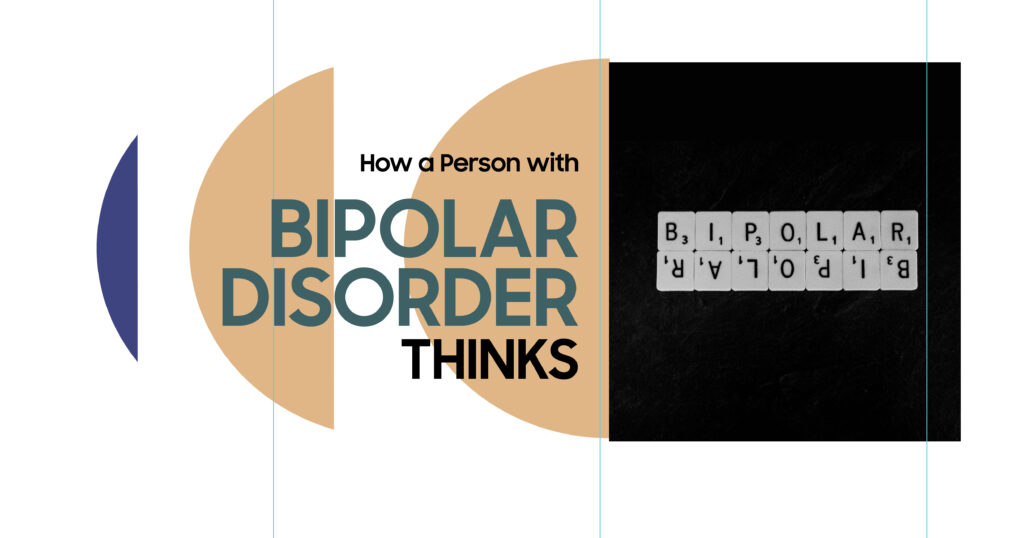Understanding How a Person With Bipolar Disorder Thinks
Although bipolar disorder cannot be fully cured, there are numerous ways to ensure a bipolar person leads a fulfilling life without letting their mental health issues overshadow their happiness. The support of their loved ones is often a key factor in the successful management of symptoms as long as the people around the bipolar individual are mindful of their thoughts and behaviors.
Whether you were diagnosed with bipolar disorder and want to know more about this condition, or your partner or friend received this diagnosis and your goal is to understand how a person with bipolar thinks and expresses themselves, this guide is for you.
How Bipolar Disorder Affects Thought Processes
Take a look at the common issues bipolar people struggle with in terms of their thought processes:
| Issue | Description |
| All-or-Nothing Thinking | You might believe that an insignificant flaw cancels out an otherwise perfect project or event – you are thinking in extremes so everything is either good or bad, with no gray areas |
Flight of Ideas | Your thoughts shift rapidly – one follows the other, and it seemingly never stops. The ideas and notions in your head may not be connected to each other at all, and when you try to speak about them, you will sound incoherent to others |
Dissociation | You may think you are disconnected from the world around you and other people – you may experience watching yourself from the point of view of another person or feel like you are in a dream |
Thought Patterns in Manic Episodes
If you want to know “Are manic eyes real?”, the answer is yes – sometimes, you can notice the manic phase by looking at the dilated pupils of the person. There are also other signs that can help you recognize a manic episode:
- The thoughts become overwhelming and intense – there are ideas, images, and worries in your mind a person cannot control.
- Reckless choices and behaviors dictate the relationship of the person with others and often lead to self-destructive actions such as spending too much money or using illegal substances.
- The levels of energy are higher than usual – the individual talks a lot, stays up all night and does not feel tired with minimal sleep, and has multiple ideas they want to bring to life.
- Psychosis might manifest itself through hallucinations and delusions – a person will see and hear things that are not real as well as have false beliefs.
Thought Patterns in Depressive Episodes
When the mood of the bipolar individual is low, it means they are going through a depressive phase – here is how it can be recognized:
- Anxiety, sadness, hopelessness, and worthlessness prevent the person from living their life – they have no motivation to participate in social events and withdraw from society.
- Self-esteem takes a hit – the individual no longer believes in their abilities and refuses opportunities that would result in personal or professional growth.
- An individual cannot concentrate on a trivial task and cannot focus long enough to memorize information, which affects their studies or work.
- Suicidal ideations are common among bipolar people – a person with bipolar thinks it would be easier to give up and no longer suffer; immediate psychological assistance is required if that is the case.
The Connection Between Bipolar Disorder and Memory
The cognitive function may be impacted by bipolar disorder – the attention span is shorter, memory loss happens frequently, especially after the manic phase is over, and the individual can no longer digest information visually or aurally. There are, however, instances when the memory is unaffected – only the behavior of the person changes. To cope with cognitive decline, talk to a therapist or psychiatrist to get medication that will allow you to stop this process in its tracks.
Bipolar Disorder and Psychosis
When the manic or depressive phase lasts for too long, psychosis is a consequence a bipolar person might have to deal with. This is a debilitating symptom since you may experience and view reality differently from the way a person without your condition would. As soon as paranoia, delusions, hallucinations, and disconnection from reality start interfering with your life, you need to seek professional help or adjust the medication you have been taking.
Intelligence and Creativity in Bipolar Disorder
Are bipolar people smart? Studies have found that the presence of bipolar disorder does not affect the intelligence of the individual – while it will change the way they perceive the world around them and communicate with others, their intellectual abilities will not suffer upon the manifestation of symptoms or the confirmation of the diagnosis.
Research has shown that bipolar individuals are more predisposed to be creative and cope with their symptoms through art and art therapy. For example, for a person with bipolar, drawing, sculpting, or artistic journaling can be the perfect creative outlet that allows them to release their emotional tension, develop self-expression skills, and reduce their stress.
How to Support Someone With Bipolar Disorder
While an individual with bipolar may cope with their symptoms on their own, it is important to show them your support and be there for them in case the manifestations of the disorder get worse. Here is what you can do for the person you care about:
| How to Help | Description |
Educate Yourself | From asking questions about the condition to learning about bipolar disorder and its manifestations on your own – there are many ways for you to figure out proper responses to severe symptoms |
Participate in Treatment | A therapist may advise the bipolar individual to undergo family therapy to manage their emotional issues – do not hesitate to talk to a counselor and lessen the burden of your family member or partner. Apart from that, driving them to the appointment or reminding them to take medication can be very useful |
Be an Active Listener | In case a person with bipolar thinks their loved ones cannot understand what they are going through, it is essential to offer your acceptance and simply hear them out when they complain or vent about their challenges |
Be Patient | When the bipolar individual is dealing with mood fluctuations, it may be hard to interact with them especially if mood swings make them angry and aggressive. If you are wondering what happens when you ignore a bipolar person instead of letting them speak their mind, the answer is – they may try to push you away or cut contact with you, which is why it is crucial to maintain gentle and open communication at all times |
Remember About Your Own Needs | Taking care of a person with a mental illness is draining even when you love them very much. When the signs of emotional and physical exhaustion become evident, take a break to avoid severe caregiver burnout, depression, and fatigue |
Get the Support You Need With Treat Mental Health
Although the recovery of the bipolar individual is largely in their hands, it does not mean their family and friends do not have to participate in the process of recovery. In addition to this emotional support, professional guidance can be the right solution to handle bipolar disorder that affects the person and their loved ones. Reach out to Treat Mental Health – our specialists are ready to answer your questions about bipolar disorder management and select therapy modalities to ensure this condition does not prevent you from enjoying life.
FAQ
What is it like living with someone who is bipolar?
There are obstacles to overcome whether the condition manifested itself after you got acquainted with the person or they had told you about the disorder when you met – there are symptoms like mood swings, low energy and motivation, mania, and hypomania that take their toll. Still, the combination of talking therapy and medication can reduce the impact of the disorder letting you interact with the individual in question without any significant issues.
How to calm a bipolar mind?
Here is how you can cope with manic episodes on your own – practice mindfulness and relaxation exercises, avoid noisy environments and activities that may trigger you, stay away from caffeine and alcohol, and stop yourself from making important decisions until you feel more relaxed.
What are the psychotic symptoms of bipolar disorder?
Psychosis is one of the worst manifestations of this condition – it is characterized by delusions, hallucinations, disordered thinking, lack of self-awareness, hygiene indifference, and self-inflicted isolation.
What do people with bipolar disorder think?
It is hard to predict the train of thought when it comes to bipolar individuals but in their most vulnerable moments, their thoughts are racing, which affects their speech. They cannot concentrate on a particular topic because their minds are going from one idea to another, and they may struggle with suicidal ideations.
How do bipolar people act in relationships?
Reckless behavior is a common manifestation of bipolar disorder which makes it difficult for a person with this condition to maintain a long-term relationship. During a depressive episode, your partner may become distant from you – try not to take it personally and work on your communication so that the individual you love knows you are there for them.








